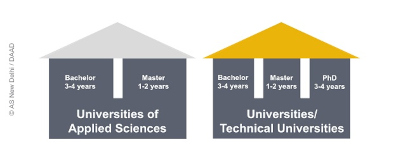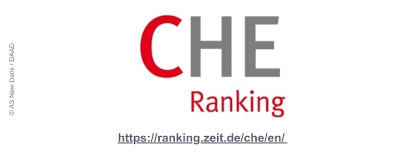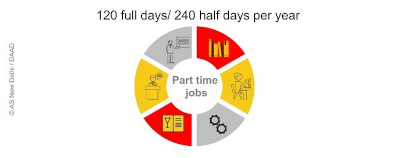- Bachelor Studies
- Universities and Programmes
- Eligibility
- Application Procedure
- German or English Medium
- Financials
- Living as a Student
- Working in Germany
- Get Guidance
- Know more
Universities and Programmes
Germany has different types of universities. Take a look, so that you know which one would suit you the best. The difference lies in focus and courses that these universities offer.
How do I choose a university in Germany?
There are various kinds of universities in Germany. A majority of these belong to either of the following categories:

© DAAD India
Universities and Universities of Technology (TU) are research-oriented. They offer a wide variety of subjects and can award doctorate degrees.
Universities of Applied Sciences (Hochschule für angewandte Wissenschaften – HAW/FH), on the other hand, are practice-oriented and offer courses mainly in engineering, business administration, social sciences and design. These have strong links to the industry and offer interesting possibilities such as joint supervision for your master thesis, where your professor and the company can together guide you .
HAWs do not award doctoral degrees, however as a master degree holder from a HAW, you are in principle eligible to apply for PhD at a university.
Your interest and inclination should define which of the two kinds of institutions you choose!
Which is the best university in Germany?
The German answer to this question is: There is no “best university”, neither in one subject and certainly not across all subjects.

© DAAD India
Germany offers a multidimensional ranking, considering various criteria that are important from a student’s perspective. For example, student and staff judgments on quality of teaching, atmosphere at the university, library and other equipment, student numbers, average study duration, number of graduations, third party funding etc. This way you get a good picture of the strengths and weaknesses of each university on www.university-ranking.de Here you can find your programme by selecting a subject, a university or even a city in Germany!
What kind of Bachelor programmes does Germany offer?
Germany offers bachelor programmes in the fields of science, engineering, humanities and social sciences, management, arts, medicine etc. The courses start either in winter or summer semester depending up on the university. The duration is generally from 3 to 4 years as per the subject.
Around 300 courses are available in English medium and around 2000 courses in German medium.
A comprehensive database of all study programmes, in both German and English, is available on www.myguide.de.
Eligibility
It is always a good idea to check if the university’s requirements and your qualifications match. And then you can start with the application procedure.
Am I eligible to apply for a bachelors degree course?
Eligibility to a bachelor’s degree course in Germany depends on the higher education entrance qualification one has earned in the home country. In principle you are eligible to apply for a bachelor programme if you fulfil one of the following criteria:
- Completing the Sri Lankan GCE A levels
- Completing IB, GCE or similar internationally recognised examination with the requisite subject combination
In Germany, every university is autonomous. This means that every university/ study programme has its own set of criteria for admitting students. So please check the university website, and specifically the programme you are interested in to find out the exact admission requirements.
Application Procedure
It is the eligibility that defines the steps in the application procedure. Find out where you need to apply.
How do I apply - after completing Sri Lankan GCE A Levels?
A Sri Lankan GCE A levels is generally recognised as a school-leaving certificate and offers either direct general university admission with a free choice of subject or subject-specific admission, depending on the subjects listed in the A Levels.
For German taught programmes higher level of German language proficiency may be required depending on the course and the university. Do connect with the university for more information.
How do I apply - after internationally recognised examination such as IB/GCE?
An IB diploma is generally recognised as a school-leaving certificate and offers either direct general university admission with a free choice of subject or subject-specific admission, depending on the subjects listed in the IB diploma. Read more
The “General Certificate of Education” (GCE) can lead to a direct but strictly subject-specific university entrance qualification in Germany. Read more
For German taught programmes higher level of German language proficiency may be required depending on the course and the university. Do connect with the university for more information.
German or English Medium
Germany offers education in German as well as in English medium. Depending up on the eligibility criteria to bachelor programme the language requirements vary.
Can I do my Bachelors completely in English medium?
Yes, around 300 courses are available in English medium and around 2000 courses in German medium.
Can I do my Bachelors in German medium?
Yes, you can of course do it in German, just that universities will demand very good German language skills. Your German language proficiency will have to be certified through standardised examinations. The course co-ordinator of your selected university can provide you the details.
Must I learn German?
As a student in Germany, your life will not be limited to the university campus. You will surely want to interact with people, do your internships, travel through the country-side and make the best of your time there. You may also want to gather work experience in Germany or build your career there. This is where knowledge of German will be of great advantage for you!
Universities offer beginner and well as advanced level courses where you can learn German. You can also start learning the language while you are still in your home country at the Goethe-Instituts (Max-Mueller Bhavan)/ Goethe-Zentrums.
Financials
While in a foreign country being able to manage your finances on your own is very important. You would need to plan your budget keeping your living expenses, travel costs and tuition fees if any.
Do I really not need to pay tuition fees?
In Germany, education is subsidised by the state and therefore state-funded institutions of higher education typically charge no tuition fee. So, in Germany virtually every student gets a scholarship!
Certain specialised courses and courses offered by private universities do attract fees. You will always frond information about the fees in the databases provided on this page and also on the university webpages and My Guide.
You will need to pay semester contribution of around Euro 300, depending upon the university and the services or benefits provided.
What kind of budget should I have in my mind?
Apart from the tuition fees, if any, you will require about EUR 934 per month for subsistence i.e. housing, food, clothing, study material and other expenses such as health insurance and leisure activities. The precise split up for this amount will be updated soon.
The amounts can vary from city to city, and of course from lifestyle to lifestyle!
The following table shows the split up at the time of the last budget indicated in 2019.
| Rent and utilities | EUR 332 |
| Food and Drink | EUR 154 |
| Clothing | EUR 48 |
| Learning Materials | EUR 24 |
| Car and Public Transportation | EUR 116 |
| Health Insurance, Medical Costs, Medicine | EUR 96 |
| Telephone, Internet, TV | EUR 32 |
| Recreation, Culture, Sports | EUR 66 |
| Total | EUR 867 |
Source: German Student Union (Deutsches Studentenwerk), 2019
Are there any scholarships available?
Generally DAAD funding in Germany is available in principle for research i.e. for masters, PhD and above.
To get a comprehensive overview of various funding possibilities, visit www.funding-guide.de.
Can I work in Germany as a student?

© DAAD India
As an international student, you are permitted to work for 120 full days or 240 half days in a year. This will help you in getting a bit of extra pocket-money!
Living as a Student
Living on your own comes with lots of responsibilities, at the same time it can also be very interesting. It starts with finding a place to stay, learning how to cook, shopping on a budget, making friends and connections. Hope this section helps you with some of your questions.
How do I find an accommodation?
Germany offers various types of accommodations:
- Students hall of residence: Here you can rent rooms provided by Student Services Organisation (Studentenwerk). They are low in cost and preferred by many students. Studentenwerk also provides specially designed Service Kits for international students. Get in touch with Studentenwerk of your city know more.
- Shared Flats (Wohngemeinschaft – WG): Shared flat or WG is another affordable accommodation, where you have your own room in a flat and share the kitchen and the bathroom with other flatmates. Living in a shared flat is cheaper as the rent and other expenses get shared. You can find advertisements for vacancies in WGs online on social media groups or on student-friendly websites.
- Private apartments: If you prefer living alone, private apartments can be an option for you. You can find them with the help of Studentenwerk, on boards in the university foyer or even on social media groups and websites for rental real estate.
Make sure to be on the lookout from early on, so that you find the best place at an affordable price.
How do I connect with other students?
Connecting with other students can help you to learn from their experience. It may also help you get acquainted with the lifestyle, once you are in Germany.
- Get in touch with DAAD Young Ambassadors. They have studied or carried out their research in Germany. Contact them with your questions, they will be happy to guide you!
- You can also find out about different student associations and groups formed by students of your country/ region.
- You can contact and locate other students on different socials media platforms as well. There are groups based on nationalities or even interests and activities.
- In the initial weeks of your first semester many universities arrange introductory events. Ask the international office of your university about them and consider participating to get to know the university. You will hear about these events once you secure a seat at a university.
Working in Germany
You can of course work in Germany as long as you respect the regulations, which are not complex and are fairly easy to understand and follow.
Can I work in Germany as a student?

© DAAD India
As an international student, you are permitted to work for 120 full days or 240 half days in a year. This will help you in getting a bit of extra pocket-money!
Can I work in Germany after my studies?
After completing your degree in Germany, you can choose from amongst a wide range of options:

© DAAD India
You can stay on in the country for up to 18 months to look for a job that is in keeping with your education. Once you find a job, the residence permit issued to you for the purpose of studying, can be converted into a residence permit for taking gainful employment.
Germany has always had a very strong industry-academia linkage. A lot of scientific research is funded by the industry as well. During your studies you can get the opportunity to do internships with German companies, which can open new vistas for your professional career.
Get Guidance
The DAAD is there to help you with your study in Germany plans. Check out how you can reach us!
My Guide
Find your way through the richness of German study programmes. Based on your academic background and interests, My GUIDE will find suitable study programmes for you. Check your entrance qualification and contact your favourite university.
Visit My Guide
Individual Appointments
You can connect with the DAAD office in Colombo or meet Team DAAD online!
Information Sessions
The DAAD offers free of cost information session about studying in Germany regularly. Check which dates and topics suit you, register and join!
DAAD also offers special scholarship sessions for Sri Lanka.
Check out the Events Page for dates, timings and registration links.
Know more
Downloads